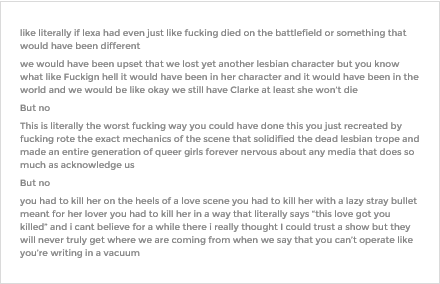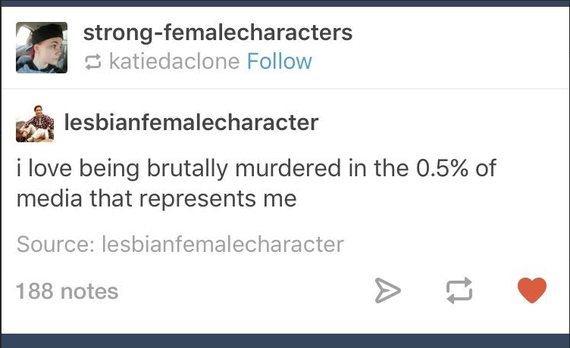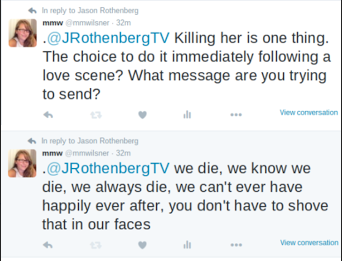Note: this post contains spoilers about the television show The 100.
"It would be a revolutionary change in film for a lesbian couple to make it to the end without one of them dying," my sister explained. She was frustrated, like many loyal viewers of the CW's The 100, by the events of the episode "Thirteen."
If you're spoiler-averse, cover your eyes now.
I'm not a viewer of the show, so I'll explain this in layman's terms--apparently the show features two young women who enter into a romantic relationship. In the episode which aired on March 3, the women finally sleep together, to the delight of the "Clexa" fanbase. Moments after consummating the relationship (literally seconds after they have sex), a misfired bullet intended for one of the women ends up killing the other. Just like that, the show's example of a happy queer couple is extinguished, causing a firestorm of disappointment on Tumblr from many of the show's fans.
When my sister was first telling me that she was disappointed by the episode, I assumed it was because the show killed off her favorite character. But before I could suggest that she take a break from the dramas and try watching The Mindy Project, she explained that the reason she was mad was that the show settled for the trope of the tragic lesbian death, an almost ever-present storyline in the small subset of film and television which features lesbian couples.
What made the tragic lesbian death trope a particularly bitter pill to swallow for fans of the show is that up to that point, The 100 was revolutionarily inclusive. I first read about the show's queer storylines in this article, published on Buzzfeed early this year. I was particularly intrigued by Executive Producer Jason Rothburg's representation of Clarke, a female character who engages in romantic relationships with both women and men, but who never self-labels as bisexual. This is a conscious decision on Rothburg's part, and one for which he faces some backlash. But as Buzzfeed reporter Louis Peitzman points out,
"The world of The 100 is one without sexual orientation, in part because it's a world where homophobia doesn't exist -- survivors have bigger concerns than other people's relationships."
That's a novel concept, and a particularly attractive one for many viewers who are sick of our society's fascination with labels. And while not all shows that feature queer characters do so in a way that is relatable to queer viewers (not a criticism, as an attempt to do so would be both impossible and narrow-minded), the way the show features strong, independent, women who are not defined only by their sexuality has clearly spoken to viewers in a way that other shows have failed.
And yet, just when the viewers thought that they would get that happy lesbian ending that the show seemed poised to promise, it regressed to a trope that queer viewers are too used to seeing.
I'm ashamed to admit that for all the time I spend watching TV (too much time), this it isn't a trope I noticed. I never really had to. As a straight white woman, I've never had to search for a character with whom I could relate. Sure, I get annoyed by how women have been portrayed in the media, but I'm surrounded by a community of allies who are given the time of day by readers who can make concepts like "the Bechdel test" household discussions. Unless you're on Tumblr where there is a treasure trove of content about the tragic lesbian death trope (don't take my word for it--please check out this tag to catch up on what queer writers and allies have been writing about on Tumblr for years), odds are you might not even think about how gay and bisexual women are presented, if at all, in the media.
The trope isn't new (the exact same plot device, down to the stray bullet, was used in an episode of Buffy the Vampire Slayer fourteen years ago), and I hadn't realized it until today because of my own damn privilege. But what I learned is that, if you're a queer woman looking for a role model, someone to relate to, someone to root for, or even someone who shares one little trait with you that validates the fact that you exist, you might find yourself searching for far too long.
Fans of The 100 watch the show prepped for an emotional rollercoaster as the writers kill off their favorite characters in droves. This particular death was more than that type of disappointment--for queer female viewers, it's another heartbreaking rejection. Another betrayal. As my sister explains it, "the tragic lesbian death trope reinforces an attitude that lesbian relationships cannot exist happily. The proximate cause of the character's demise is her lesbianism, which reduces the character to nothing more than her sexuality, an identity which is rejected at every turn." Check out how some other viewers describe their thoughts:

Source

Source

Source
To the writers of The 100--you are making enormous strides by giving queer fans characters that they can actually look up to. Television may well become even more representative as a result of your groundbreaking efforts. But come on--just let the lesbians live.